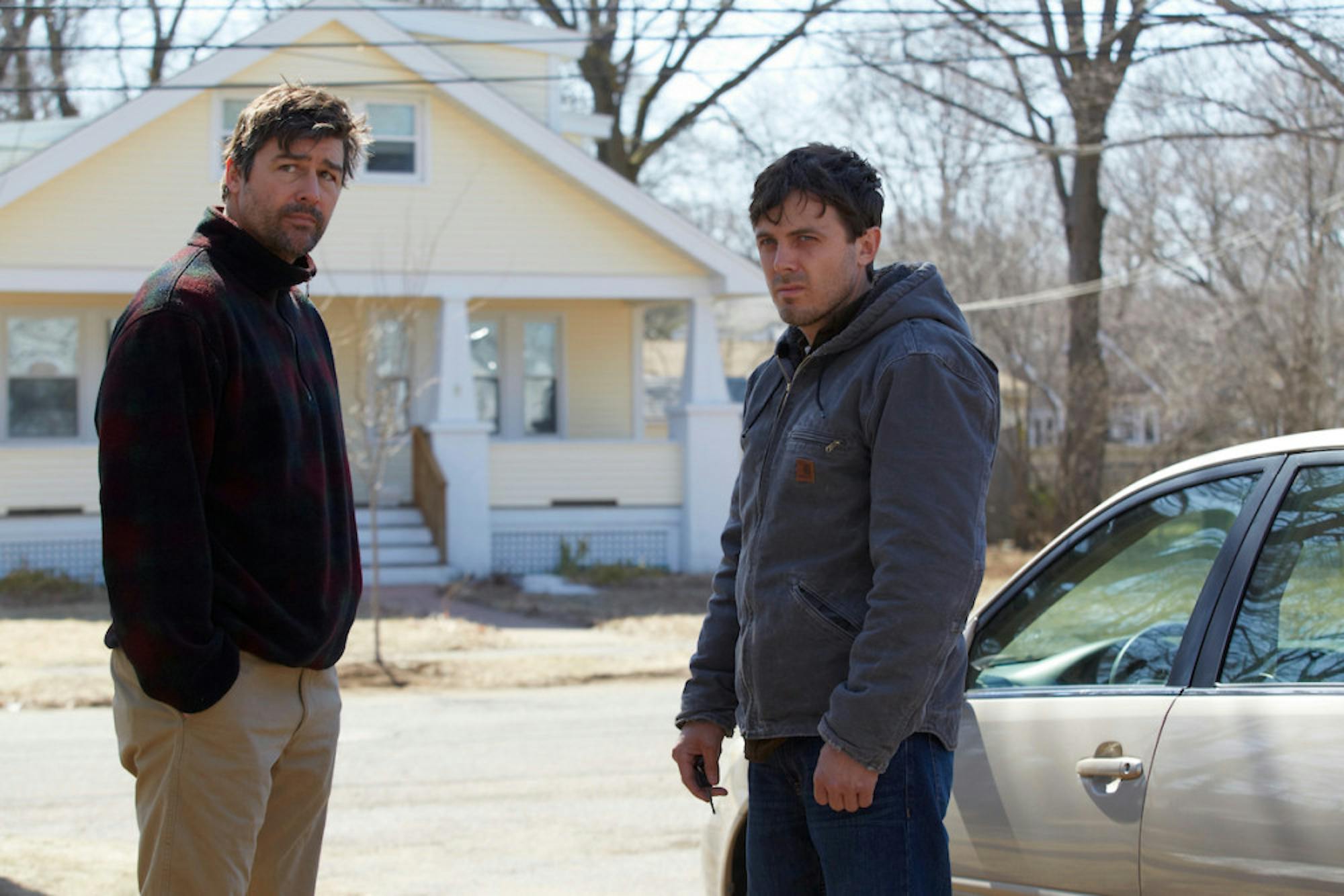Director Kenneth Lonergan’s third picture tells the story of a cut so deep that it cannot heal. Its mournful beauty is discomforting, with the kind of sadness that evokes silence rather than tears. The vessel of that grief is Lee Chandler, played with breathtaking excellence by Casey Affleck. Lee, a handyman for a Quincy apartment complex, is a shell of misanthropy and detachment when the audience meets him. He’d rather slug a bar patron over an invented slight than flirt with an interested woman, and he adamantly refuses to make repair decisions for the tenants he works for, deflecting their requests for advice.
When he gets a call informing him that his brother Joe (Kyle Chandler) has had a heart attack, he rushes home to Manchester and must deal with the aftermath: the doctors, the funeral home, the will and his now guardian-less teenage nephew Patrick (Lucas Hedges).
The little inconveniences that become infuriating during a time of grief are rendered in all their painful mundanity. A request for a tissue to wipe away tears, the annoyance of waiting to pick up Joe’s misplaced belongings – these constant quotidian reminders keep the wound fresh. There’s an almost farcical quality to these things that make them all the more real, as when a devastated Lee and the men with whom he’s sharing a table stand up, their chairs loudly scraping the floor as they pause momentarily, no one really knowing what to say.
Lee is appointed Patrick’s guardian, and the two deal with the loss of Joe together. The blow is softened by their acceptance of the fact that Joe was living on borrowed time, having been diagnosed with congestive heart disease years earlier. Patrick remains functional, able to ask Lee to ferry him between school and his two girlfriends’ houses, and he is still eager to meet his estranged alcoholic mother Elise (Gretchen Mol). He is by no means unscathed, but his loss pales in comparison to what returning to Manchester forces Lee to confront -- a memory that, as it is slowly spelled out in flashbacks, completes Lonergan’s past and present portrait of a shattered man.
These jumps in time are effortlessly integrated, giving context to the events of the present while remaining perfectly distinguishable as memories despite the absence of anything to mark them as such. The opening scene is an interlude of Lee, Joe and a young Patrick (Ben O'Brien) on the family boat, Lee jokingly persuading Patrick that he’d be the better choice over Joe to bring to a desert island. Even before the tragedy that ended Lee’s marriage to Randi (Michelle Williams) and sent him away to Boston is made apparent, the contrast between his demeanor then, all smiling confidence, and his aversion to deciding for others now signals that something is off.
When he runs into Randi in town, now remarried and a new mother, their conversation is gut-wrenching. There’s no hint of a romantic rekindling, only the rawness of what happened to them years earlier. Randi is all emotion, desperate to work through some of their pain, but Lee is simply too damaged. When she asks him to get lunch, her sorrow and pity are like arrows to Lee. Affleck embodies that pain, shying away with raised shoulders and a look pleading her to let him go as his quietly strained voice asks the same.
The film is set to an original score by Lesley Barber that is supplemented by classical pieces, most notably sections of Handel’s “Messiah” oratorio. Barber’s choral and instrumental compositions are a high point and thematically seem to fit the film more closely than the other works. “Messiah” tells of the Passion and the resurrection of Jesus, and while Lee has suffered pain, his story is missing that triumphant ending. If “Messiah” and the other pieces not original to the film were included simply for their aesthetic quality, it is puzzling that Barber wasn’t entrusted with scoring the entirety of the film.
That this is the film’s greatest flaw speaks volumes. “Manchester by the Sea” has been receiving rave reviews since its January debut at Sundance, where Amazon Studios purchased distribution rights for an enormous $10 million. It is a bet that seems likely to pay off when the film enters wide release later this month. Despite the industry and awards buzz surrounding the film, there is nothing spectacular or grand on display here, nothing to be blown away by. And that is what makes it so devastating. Lonergan doesn’t tug at the heartstrings, doesn’t snatch the life out of a beloved character. Rather, he tells a simple an expertly crafted story, a soulful elegy for a life that could have been.
'Manchester by the Sea,' a heartbreaking triumph

Summary
4.5 Stars





